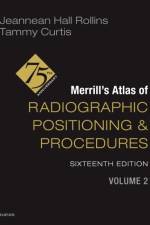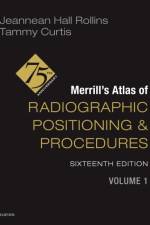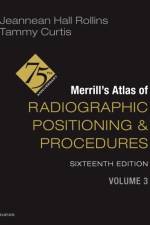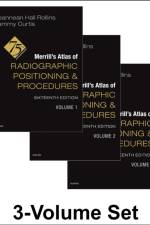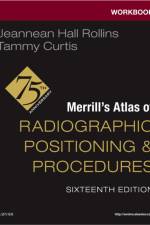av Jeannean Hall (Associate Professor Rollins
3 547
Learn and perfect your positioning skills with the leading radiography text and clinical reference! Merrill's Atlas of Radiographic Positioning & Procedures, 16th Edition, describes how to position patients properly, set exposures, and produce the quality radiographs needed to make accurate diagnoses. Guidelines to both common and uncommon projections prepare you for every kind of patient encounter. Anatomy and positioning information is organized by bone group or organ system, and coverage of special imaging modalities includes CT, MRI, sonography, radiation therapy, and more. The gold standard in imaging, Merrill's Atlas covers all procedures in the ASRT radiography curriculum and prepares you for the ARRT exam. NEW! Respiration heading emphasizes the importance of proper breathing instructions for maximizing image quality. NEW! Patient positioning photos enhance chapters on the chest, abdomen, pelvis and hip, bony thorax, upper extremity, and lower extremity. NEW and UPDATED! Additional figures and content in special imaging modality chapters represent current practice, protocols, safety measures, and technology in pediatric imaging, computed tomography, magnetic resonance imaging, diagnostic medical sonography, mammography, molecular imaging, nuclear medicine, and radiation oncology. UPDATED! Unit values expressed as SI units, with traditional units provided in parentheses, match the format used in imaging technical texts and the ARRT exam. UPDATED! Gonadal shielding guidelines align with current clinical practice. UPDATED! Collimation field sizes and image receptor sizes are simplified for enhanced clinical relevance. STREAMLINED! Rounded decimal values replace fractions throughout the text. Comprehensive, full-color coverage of anatomy and positioning makes Merrill's Atlas the most in-depth text and reference available for radiography students and practitioners. Guidelines to each projection include a photograph of a properly positioned patient and information on patient position, part position, respiration, central ray angulation, collimation, kVp values, structures shown, and evaluation criteria. Diagnostic-quality radiograph for each projection demonstrates the result the radiographer is trying to achieve. Coverage of common and unique positioning procedures includes chapters on trauma, mobile, surgical radiography, geriatrics, and pediatrics to help prepare you for the full scope of situations you will encounter. Numerous CT and MRI images enhance comprehension of cross-sectional anatomy and help in preparing for the Registry examination.

